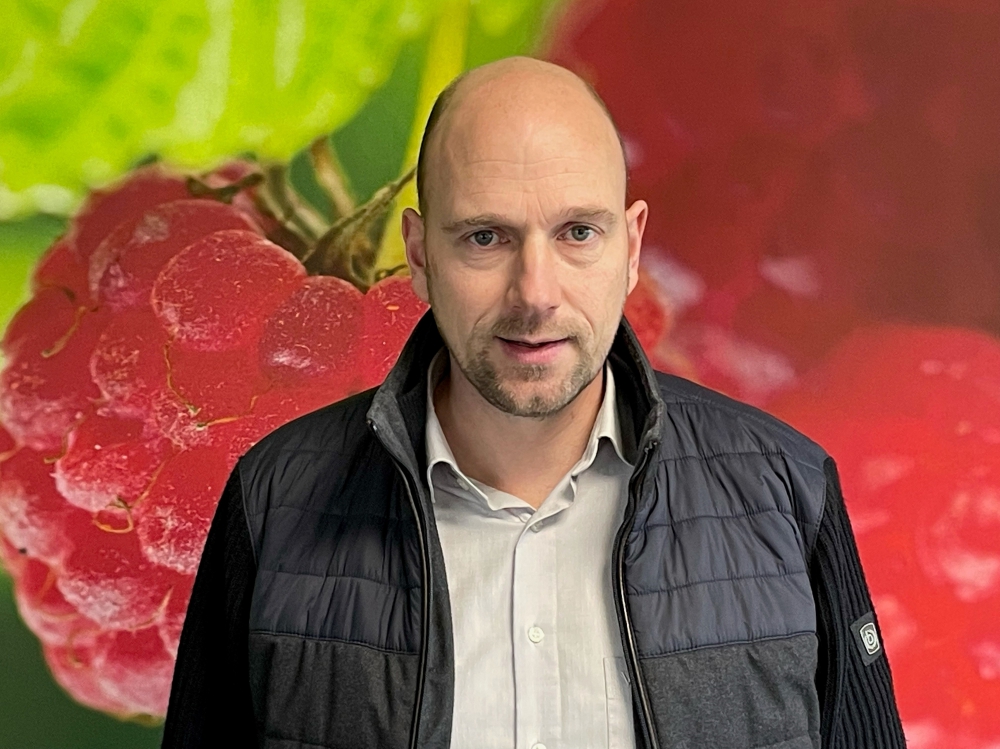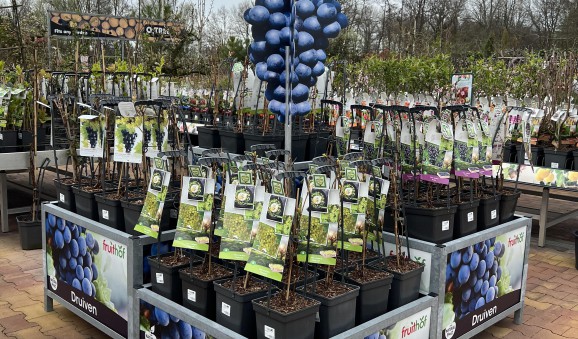Trade fair GrootGroenPlus, an international platform for purchasing and relationships

When planning a visit to a trade fair, you naturally want to evaluate the offerings beforehand. Is this trade fair worth my time and travel expenses? For professionals in the green industry, the answer is a resounding YES when it comes to trade fair GrootGroenPlus. This trade fair, which is traditionally held in the first week of October in Zundert, focuses on green products.
These products -whether plants, shrubs, or trees- are presented in every conceivable shape and form, from young plants for further cultivation to standard trees and tall fruit trees. Garden centres and landscapers will find a wide range of visually appealing products here, from both domestic and international growers. This includes perennials, aquatic plants, colourful shrubs, and trees attractive for their blooms, foliage colour, and/or shape. With changing climatic conditions, Mediterranean planting is also gaining popularity. Moreover, GrootGroenPlus serves as a crucial platform for establishing new relationships and maintaining existing ones.
Expansion of international visits and participation
One of the key objectives of GrootGroenPlus is to increase the number of international participants and visitors. Besides the long-standing practice of inviting and hosting international journalists, another strategy is to attract foreign buyers, garden centres, and trade organisations. This strategy is now facilitated by a contribution from the European Plant Support Foundation (EPS). Through this project, GrootGroenPlus can specifically focus on attracting potential participants and promoting the trade of nursery stock products, with an emphasis on the visually appealing segment and related technologies. Engaging in international business as a grower or trader is no small feat. You will have to comply with several government regulations. One crucial requirement for trading and transporting plants and plant materials within Europe is the plant passport. A plant passport is a collection of mandatory information that must accompany the trade of all plants intended for planting within the European Union (EU). It provides details about the identity and origin of the shipment and allows the tracking of the original producer. The presence of a plant passport indicates that the producer complies with the existing rules and standards set forth in the European Plant Health Regulation and operates under the inspection regime of an authorised inspection service. The plant passport also serves as a kind of quality assurance measure. The European plant passport system is essential for mitigating plant health risks within the European Union. It ensures that the identity and origin of plants and plant materials are well documented. This is crucial for preventing the outbreak and potential spread of harmful diseases and pests and for enabling swift traceability. Another key regulation for international traders to comply with is the requirement for the PZ code, which ensures that the plants being traded are free from harmful organisms. PZ stands for ‘Protected Zone’. While the Netherlands itself does not have any Protected Zones, the destination countries for your products might. For detailed information on Protected Zones and the harmful organisms associated with them, growers and traders should refer to the website of the Netherlands Food and Consumer Product Safety Authority (NVWA).
Trade fair as an inspiration for market-oriented practices
Henriëtte van der Steen, account manager at Bricks Presentation BV, views participating in trade fair GrootGroenPlus primarily as an opportunity to inspire market-oriented practices. Her perspective is particularly focused on the suppliers catering to garden centres. “We participate in GrootGroenPlus because we see this trade fair as a genuine opportunity for inspiration and relationship-building with our clients,” she explains. “It’s an ideal platform for us to showcase the added value we bring to our customers. Growers present a wide range of plant assortments tailored for the retail market, alongside other products that are beneficial for green retailers. Buyers attend the trade fair looking for opportunities and solutions that they can implement in their garden centres. They seek products that enhance their store’s offerings, and they have a need for presentation and communication.” What would be a simple and effective way to present yourself, according to Bricks? Henriëtte: “By using Bricks as ‘pearls’ on the retail floor, you can create attractive display islands that significantly boost sales. Consumers often have numerous questions. They want to know what they can expect from a product or where to find it. Many garden centres face a shortage of staff, but consumers still need information. This is where Bricks steps in with innovative 3D recognition signs and other communication tools. Think of life-sized strawberries, apples, pears, or a butterfly or ladybug, or shapes featuring atmospheric photos and USP’s. This way, we take some of the load off of garden centres, while still encouraging sales.” Henriëtte also highlights sustainability as a crucial focus area. This encompasses not just the plants and irrigation practices but also the products provided by the supply industry. Bricks, for instance, supplies display units and Point of Sale (POS) materials. Henriëtte elaborates, “Our frames are made of galvanized steel, which makes them rust-resistant and ensures they can last for decades. The printed POS panels are either recyclable or already made from recycled materials.” She continues to expand on the importance of sustainability: “Both retailers and growers, along with the supply industry, must prioritize sustainability. It’s becoming an increasingly significant theme and a commonly used term in the market. This means that any innovation must go beyond mere cosmetic changes. It needs to offer real advancements in areas like resistance, biodiversity, and circularity.”
Ideal to meet clients
Maurice van Meel of Handelskwekerij Het Eyssel BV calls GrootGroenPlus the perfect place to meet a lot of customers and suppliers in just a few days time. Handelskwekerij Het Eyssel BV offers a wide assortment of perennials, grasses, ferns, herbs, and ground covers. The trading nursery is predominantly supplied by plants from its own nursery, Het Eyssel BV, located in Meerle on the BelgiumNetherlands border, near the location of trade fair GrootGroenPlus. Het Eyssel BV offers an attractive assortment of over 1,500 different types of plants cultivated in P9 pots. The focus is on wholesale, municipalities, large-scale green space providers, garden centres, landscaping, and export. For Van Meel, it is a real relationship trade fair. The real business transactions happen at a later stage, based on the connections made during the trade fair. “We notice that our customers are increasingly more focused on aspects like biodiversity and sustainability, which truly aligns with the demand from the (consumer) market,” says Maurice. The company supplies many exporters, but Het Eyssel also deals with regulations, such as complying with PZ codes. “You really need to pay close attention to these,” Maurice notes, “but once you understand how it works, it’s not a problem.”
New opportunities for networking
A relatively new participant of GrootGroenPlus is De Fruithof, from Kapelle in Zeeland, a total supplier of a complete fruit concept for garden centres at home and abroad. De Fruithof has a wide assortment of about 170 different varieties, from small fruit to large fruit trees. Managing Director Wiggert-Jan van Wijngaarden emphasises that both the wide assortment and the operational management respond to the demands from the market, from both the retail trade and the end user, the consumer. For example, the fruit concept goes beyond just supplying good plants. It also consists of beautiful presentation tables, sleek banners and stylish labels. Deliveries are made to garden centres and other points of sale of greenery all over Europe. All plants are grown in pots and the assortment is therefore available throughout the year. The fruit trees are on slow-growing rootstock. This makes them very suitable for the private garden and they produce really tasty fruit. Sustainability plays an important role at De Fruithof. This is reflected in the certificates and appreciation of MPS and GLOBAL GAP. An important part of this is the registration and appreciation of the use of pesticides. In recent years this has decreased significantly. The starting point is the vision ‘Organic where possible and chemical where necessary’. De Fruithof has also started working with peat substitutes.
The sustainability policy also includes the careful handling of water. Wiggert Jan: “To provide our plants with water, we use an ebb and flow system. Because the collected rainwater is stored and reused in large basins, little water is lost.” De Fruithof also has to deal with the demand for the so-called PZ code, which must safeguard buyers from plants containing harmful organisms. Wiggert Jan: “Proper handling of these codes is also part of careful management. Sometimes you have to conclude that unfortunately you cannot deliver to some protected areas.” Wiggert Jan van Wijngaarden sees participation in GrootGroenPlus 2024 as a good test to see if good contacts can be made with new companies and also to connect with existing national and international relations. “Our products have been at GrootGroenPlus before,” says Wiggert Jan, “but until now only in combination with suppliers from the technical sector who then used our plants to indicate the possibilities of their product. But now we are there independently with our fruit concept.”
On behalf of GrootGroenPlus: Didier Hermans, member of the board
“At GrootGroenPlus you can find anything, all themes are covered. It is a really green trade fair, with many growers, but also interesting for garden centres and garden contractors. Together, we make this world a greener place.”
